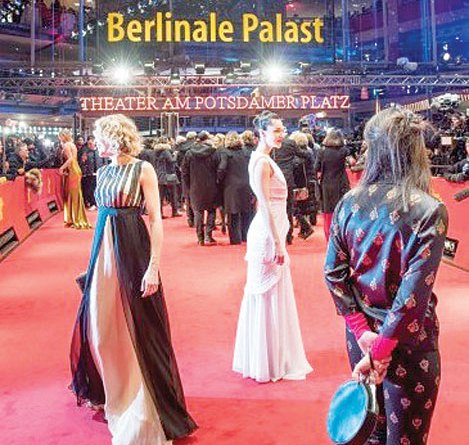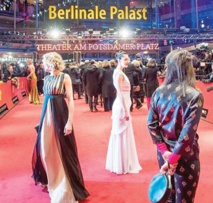Berlin (dpa) – The Berlin International Film Festival could be poised to enter a new era when it opens next week with hopes that its renewed leadership team might rejuvenate the 70-year-old event.
Eighteen films - including 16 world premieres - are in the running for the Berlinale's top prize: the Golden Bear for best picture.
The festival's main competition has a heavy focus on arthouse movies which largely draw on dark themes, touching on issues such as immigration, family life and opposition to political authorities.
"I want to have films that talk about the world we live in," the festival's new artistic director Carlo Chatrian told Berlin foreign correspondents on Friday.
The former head of the Locarno Film Festival, Chatrian and his co-director Mariette Rissenbeek, who heads business operations, take up their posts as the Berlinale struggles to regain its authority as one of the top movie showcases as it faces growing competition from rival festivals.
Chatrian and Rissenbeek have already moved to revamp the Berlinale since taking over less than year ago from long-running director Dieter Kosslick, who presided over a major expansion of the festival during his 18 years in the job.
They have trimmed the number of sections at the Berlinale and introduced a new section called Encounters, aimed at innovative movie making.
They have also cut the number of films to be screened throughout the 10-day festival to 340 from about 400 last year.
But the question now is whether this year's programme will entice directors and stars back to Berlin after the festival lost out in recent years to its rivals in Cannes and Venice.
Canadian film director Philippe Falardeau's new film about an aspiring poet answering the fan mail of cult US author J.D. Salinger is due to open the festival.
"My Salinger Year" stars Golden Globe winner and Oscar nominee Sigourney Weaver and Margaret Qualley, who recently featured in Quentin Tarantino's "Once Upon a Time in Hollywood."
Among those also likely to attend the festival are US actors Johnny Depp, Laura Linney, Elle Fanning and Willem Dafoe and Australia's Cate Blanchett.
Former US presidential candidate Hillary Clinton is also expected for a screening of a documentary about her political life, called "Hillary".
Founded during the early days of the Cold War, the Berlinale has been a major draw over the years for names such as Julia Roberts, Sophia Loren, Gary Cooper and Brad Pitt.
But with Hollywood films again in short supply at this year's festival, Berlin can expect fewer of the US stars whose glamour provides the lifeblood of movie showcases.
Instead, Europe will provide much of the star power with ten of the movies in the main competition coming from European nations.
Big names include Spain's Javier Bardem, who stars in British director Sally Potter's father-and-daughter story "The Roads Not Taken." US-Mexican actress Salma Hayek is also featured in the movie.
Chatrian said he was happy about the stars attending the Berlinale, but that even more than attracting big names, "we want to strengthen the festival."
German stars such as Nina Hoss and Lars Eidinger are also slated to be in town for Swiss directors Stephanie Chuat and Veronique Reymond's family drama "Schwesterlein" ("Little Sister").
Berlinale regular Christian Petzold is returning this year with "Undine," the first of a trilogy of films exploring figures from the German romantic era.
US independent film-makers Eliza Hittman and Kelly Reichardt are set to help carry the flag for America in the festival's main competition.
Hittman's "Never Rarely Sometimes Always" tells the story of two young women from rural America travelling to New York. Meanwhile, the western genre gets a more human and political spin in Reichardt's "First Cow."
Hittman, Reichardt and Potter are three of six women directors whose films are vying for the Golden Bear.
Another highly-anticipated competition entry is German-Afghan director Burhan Qurbani's "Berlin Alexanderplatz," which lifts the 1929 German classic novel by Alfred Doeblin into the modern day with a refugee from Africa as its main character.
Asia is represented by South Korean director Hong Sangsoo, in Berlin for the third time, with "The Woman Who Ran." And Tsai Ming-liang's "Rizi" ("Days") sees the return of the Taiwanese-born director, who made his debut at the festival in 1993.
The only documentary included in the main competition is from Cambodian-born Rithy Panh with "Irradies" ("Irradiated") about the horrors of his country's past.
Before the curtain goes up on this year's Berlinale, Chatrian and Rissenbeek found themselves in a media storm over their choice of Oscar-winning British actor Jeremy Irons as president of this year's festival jury. Irons has been criticized for comments he made about gay marriage and women.
The festival has also been forced to suspend the presentation of the Alfred Bauer Prize – named after the Berlinale's first director - after a media report revealed previously unknown details about his close contacts with the Nazi Party.
The festival's main competition has a heavy focus on arthouse movies which largely draw on dark themes, touching on issues such as immigration, family life and opposition to political authorities.
"I want to have films that talk about the world we live in," the festival's new artistic director Carlo Chatrian told Berlin foreign correspondents on Friday.
The former head of the Locarno Film Festival, Chatrian and his co-director Mariette Rissenbeek, who heads business operations, take up their posts as the Berlinale struggles to regain its authority as one of the top movie showcases as it faces growing competition from rival festivals.
Chatrian and Rissenbeek have already moved to revamp the Berlinale since taking over less than year ago from long-running director Dieter Kosslick, who presided over a major expansion of the festival during his 18 years in the job.
They have trimmed the number of sections at the Berlinale and introduced a new section called Encounters, aimed at innovative movie making.
They have also cut the number of films to be screened throughout the 10-day festival to 340 from about 400 last year.
But the question now is whether this year's programme will entice directors and stars back to Berlin after the festival lost out in recent years to its rivals in Cannes and Venice.
Canadian film director Philippe Falardeau's new film about an aspiring poet answering the fan mail of cult US author J.D. Salinger is due to open the festival.
"My Salinger Year" stars Golden Globe winner and Oscar nominee Sigourney Weaver and Margaret Qualley, who recently featured in Quentin Tarantino's "Once Upon a Time in Hollywood."
Among those also likely to attend the festival are US actors Johnny Depp, Laura Linney, Elle Fanning and Willem Dafoe and Australia's Cate Blanchett.
Former US presidential candidate Hillary Clinton is also expected for a screening of a documentary about her political life, called "Hillary".
Founded during the early days of the Cold War, the Berlinale has been a major draw over the years for names such as Julia Roberts, Sophia Loren, Gary Cooper and Brad Pitt.
But with Hollywood films again in short supply at this year's festival, Berlin can expect fewer of the US stars whose glamour provides the lifeblood of movie showcases.
Instead, Europe will provide much of the star power with ten of the movies in the main competition coming from European nations.
Big names include Spain's Javier Bardem, who stars in British director Sally Potter's father-and-daughter story "The Roads Not Taken." US-Mexican actress Salma Hayek is also featured in the movie.
Chatrian said he was happy about the stars attending the Berlinale, but that even more than attracting big names, "we want to strengthen the festival."
German stars such as Nina Hoss and Lars Eidinger are also slated to be in town for Swiss directors Stephanie Chuat and Veronique Reymond's family drama "Schwesterlein" ("Little Sister").
Berlinale regular Christian Petzold is returning this year with "Undine," the first of a trilogy of films exploring figures from the German romantic era.
US independent film-makers Eliza Hittman and Kelly Reichardt are set to help carry the flag for America in the festival's main competition.
Hittman's "Never Rarely Sometimes Always" tells the story of two young women from rural America travelling to New York. Meanwhile, the western genre gets a more human and political spin in Reichardt's "First Cow."
Hittman, Reichardt and Potter are three of six women directors whose films are vying for the Golden Bear.
Another highly-anticipated competition entry is German-Afghan director Burhan Qurbani's "Berlin Alexanderplatz," which lifts the 1929 German classic novel by Alfred Doeblin into the modern day with a refugee from Africa as its main character.
Asia is represented by South Korean director Hong Sangsoo, in Berlin for the third time, with "The Woman Who Ran." And Tsai Ming-liang's "Rizi" ("Days") sees the return of the Taiwanese-born director, who made his debut at the festival in 1993.
The only documentary included in the main competition is from Cambodian-born Rithy Panh with "Irradies" ("Irradiated") about the horrors of his country's past.
Before the curtain goes up on this year's Berlinale, Chatrian and Rissenbeek found themselves in a media storm over their choice of Oscar-winning British actor Jeremy Irons as president of this year's festival jury. Irons has been criticized for comments he made about gay marriage and women.
The festival has also been forced to suspend the presentation of the Alfred Bauer Prize – named after the Berlinale's first director - after a media report revealed previously unknown details about his close contacts with the Nazi Party.









 Home
Home Politics
Politics











